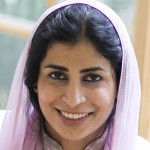Naila Baloch, Muslim Chaplain
NAILA BALOCH
MUSLIM CHAPLAIN
Naila A. Baloch has served as Muslim Chaplain at Tufts University since 2009. She completed her Master in Theological Studies at Harvard Divinity School in 2008. Her academic sojourns have also taken her to Williams College, where she studied Astrophysics and Comparative Religion, and to Oxford University. She has worked for the Pakistan Senate, in the International development sector in Pakistan, and in various capacities as a researcher.
She started her training at Harvard Divinity School as their first female, Muslim ministry student to prepare for positions of religious service. She is deeply interested in the religious and spiritual life of youth, and the specific challenges Muslim youth face in a diverse, multicultural, multi-ethnic, and multi-religious society. She values integrity, tolerance, love, and a spirit of openness to difference, and strives to embody these qualities in her own interactions.
At HDS, Naila focused on scriptural exegesis and Islamic law. She also concentrated in performance to explore creative expression as a spiritual act. She received a graduate grant from Harvard University to conduct field research on how young, urban, Pakistani, Muslim women experience religion in their everyday lives. This research sought to bridge the gap between academic discourses on Islam and Muslim women, and the practical reality of everyday life for many Muslims.
As one of those who have lived on both sides of the seeming Islam-West divide, and who feels love and compassion for both, she is deeply committed to building bridges and encountering the ‘other’ in her human face.
Born in a household of both Shi’as and Sunnis, two often conflicted sects of Islam, she understands the value and richness of incorporating diversity and a multiplicity of viewpoints. She believes that a strong community gives voice to all of its constituents. In that spirit, she would like to help foster a community at Tufts that welcomes all people, and offers spaces for peace, learning, engagement, acceptance, and opportunities for self-development and growth.
